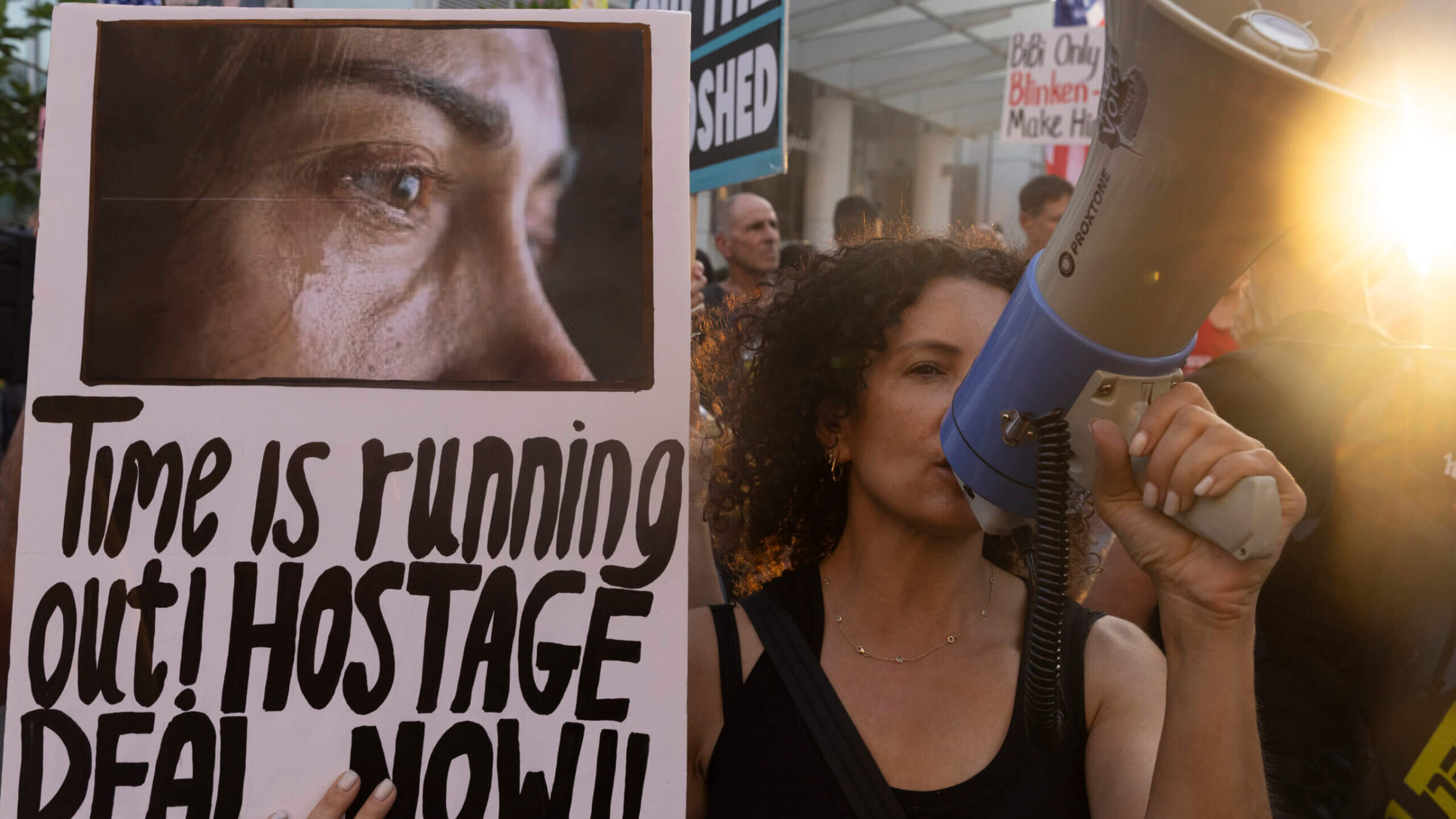Israel keeps retrieving dead hostages, and American Jews keep avoiding political action
The American Jewish world shows concern for the hostages’ plight but doesn’t want to spend political capital to force the issue

Families of hostages and supporters demonstrate outside a press event by U.S. secretary of state Antony Blinken Aug. 19 in Tel Aviv. The IDF retrieved today six more bodies of hostages killed in Gaza. Photo by Amir Levy/Getty Images
Israel retrieved the bodies of six more hostages from Gaza today, including that of Avraham Munder, a 79-year-old resident of Kibbutz Nir Oz who, up until this point, had been presumed alive. His nephew, Eyal Mor, told an Israeli broadcaster: “We waited for a deal that would bring everyone back, and reality proved us wrong this morning.”
In May, when a hostage deal approved by Israeli negotiators was on the table, I went to protests calling on Israeli Prime Minister Benjamin Netanyahu to take the deal. Fellow activists and I were harassed by people in #BringThemHomeNow shirts, calling us “Hamas” for taking a position that is fairly mainstream in Israel, where three-quarters of Israelis want Netanyahu to resign.
In Israel, where a small minority share my values of justice and freedom for Palestinians, thousands of Israelis have been protesting in the streets for months for a hostage deal. There is an understanding that a deal is the only way forward, and they are willing to use political pressure to reach it. By contrast, there is a huge disconnect in the American Jewish world between a stated concern for the hostages’ plight and using political capital to force the issue. When it comes to actual political solutions to the ongoing crisis, our American Jewish communities are, at best, silent, and at worst, actively hostile.
Since October, American Jews have found ways to keep the hostages front-of-mind. Every week, well-meaning Jews say Mi Sheberach — a prayer used to request healing or a blessing from God — for the hostages in shul. They go to events like #RunForTheirLives, in which participants walk or run for 18 minutes while wearing matching #BringThemHomeNow T-shirts, in an attempt to show they are a united national movement. They put up #BringThemHomeNow posters with photos of the hostages, making sure that we never forget some of our own are being held captive. These actions, however, are not sufficient for this moment of crisis. Saving our brothers and sisters in captivity, stopping the mass slaughter of innocent people in Gaza, and building a just future — these things require political action.
For all of the urgency conveyed by the #BringThemHomeNow messaging, the American Jewish community largely refuses to criticize Netanyahu and maligns political activists who are willing to take a stand or support positions that would actually realize their stated political goals. The refusal of American Jews to add crucial pressure to finalize such deals testifies to the mere lip service that is being paid to this literal life-and-death issue.
Even among American Jews who call for a hostage deal, such as the nearly 100 U.S. rabbis and cantors who signed a letter in August urging Netanyahu to accept a deal, this call is not linked to political pressure. The letter, though it is a step in the right direction, does not call even for a ceasefire — the most basic requirement for any political deal. Moreover, American Jews have not exerted economic or political pressure on Israel and the U.S. to heed their demands. American Jews have not refrained en masse from sending their children on yearlong Israel programs, for example, and have not collectively pressured their American politicians to hold Israel accountable.
Instead, American Jewish communities largely continue to rally for Israel. They organize mission trips to Israel, laud the Israel Defense Forces and share fundraisers for Israeli causes. They donate and volunteer for politicians who support Netanyahu’s bad-for-all-sides-war. Though they might desire that we #BringThemHomeNow, American Jewish leadership has largely failed to forcefully advocate for the hostages’ return in any realistic way. Under the guise of supporting Israel or combating antisemitism, the American Jewish community has abandoned its moral and political responsibilities.
On the streets of New York on Tisha B’Av last week, I handed out with my fellow activists from Halachic Left — a grassroots organization I co-founded which focuses on opening new conversations on Israel and Palestine in religious spaces — copies of “For These Things I Weep,” a companion text to the traditional Lamentations reading for this time of mourning. We explained to passersby why we were spending our Tisha B’Av grieving publicly for both the Israeli hostages and for the Palestinians murdered by Israel. I expected to spend the day explaining why I was mourning for Palestinians. Instead, passersby continually challenged why our group thought a ceasefire deal would be good for the Jews or bring the hostages home.
They could understand — though disdainfully — that we were Jews protesting for Palestinian freedom. But the idea that our demonstration was motivated by the same care for the hostages that underlies largely symbolic actions like #RunForTheirLives and empty Shabbat tables set across the country seemed to be a novel concept for the many passersby with whom we spoke. They were mystified that a ceasefire, justice for Palestinians and a hostage deal were being promoted by the same group.
My activism for safety and justice for Palestinians is informed by the understanding that violence harms all of us, and that only a just and lasting solution will liberate us all from this pattern of horror and destruction. A peaceful and just resolution is the only way forward, morally and practically. Of course, this includes the hostages, whose lives the Israeli government has been deprioritizing for months.
What I saw on the streets of New York on Tisha B’Av is that this disconnect American Jews have comes from a place of fear. Even as people I spoke with expressed hope for a hostage deal, they also expressed their anxiety about calling on President Joe Biden to restrict arms sales or monetary aid to Israel — which is realistically the only way the international community can pressure Israel into accepting a deal. Fear of speaking out, of endangering Israel, of being isolated from their community makes people hesitant to attach their ideals to any political call or action.
Since Oct. 7, our communities in the U.S. have been mourning the tragedy the Jewish world has experienced. Now, it is time to shift our mourning toward action. In this time of mass death, we as American Jews have an obligation to leverage our voices and our resources to prevent further bloodshed, by calling on our country to stop arming Israel’s slaughter of Palestinians, and finally bring the hostages home.
“Body retrievals don’t impress me,” Munder’s nephew Zahiro Shahar Mor told Haaretz upon the news that the IDF had brought his uncle’s body home to Israel. They shouldn’t impress American Jews either.

















